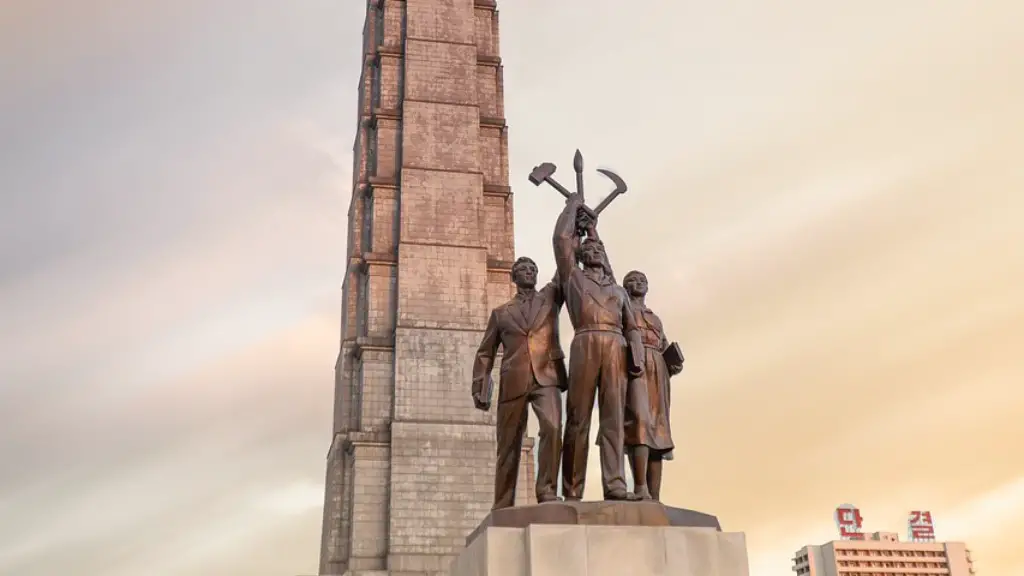Overview
The age-old question of whether to nuke North Korea has come under increasing scrutiny in the last few years. The United States is a key player in the debate as it is known to possess the most powerful and destructive weapons in the world. North Korea has shown a pattern of aggressive posturing and saber-rattling, which has provoked international organizations into seeking viable solutions. With the world increasingly split on the issue, an analysis of the pros and cons of such an option is required.
Background
Tensions between the United States and North Korea have been rising steadily in recent years. North Korea has been expanding its nuclear weapons capabilities and has had several test launches of long-range missiles capable of reaching U.S. territory. In response, President Trump has taken a harder stance on North Korea and has threatened “fire and fury” if they do not back down. This has reignited the debate about the potential impacts of using a nuclear weapon on North Korea.
There are those who argue in favor of a nuclear attack on North Korea. Proponents argue that doing so could remove the regime and drastically change the geopolitical landscape in the region. Some believe that a nuclear attack could be more effective in neutralizing North Korea than a conventional attack, which could lead to a drawn-out war.
At the same time, there are many who are strongly against taking such an action. Opponents fear the consequences of a nuclear strike, including the potential for retaliatory attacks, loss of life, and long-term fallout. Many believe that the use of nuclear weapons goes against the international rules and laws that are in place to protect civilians.
Experts’ Perspective
The topic of nuking North Korea is a controversial one and opinions vary greatly. Experts argue on both sides of the issue, and there is no simple answer.
Dr. Robert Kelly, a political science professor at Pusan National University, believes that the use of a nuclear weapon against North Korea is not a viable option. He argues that the consequences would be too great and unpredictable, and that such an action would ignore the implications for both Korean and U.S. citizens.
In contrast, Richard Ned Lebow, a professor of international political theory at the War Studies Department of King’s College in London believes that a nuclear attack could be effective in stopping North Korea’s progress. He believes that the use of a nuclear weapon would be unfortunate but necessary in order to put an end to the North Korean regime.
Data and Analysis
In order to truly evaluate the potential for nuking North Korea, it is important to consider the potential implications of such an action. According to the International Campaign to Abolish Nuclear Weapons, even a limited nuclear attack on North Korea could lead to the destruction of hundreds of thousands of lives, as well as devastating environmental and economic consequences.
Additionally, the use of a nuclear weapon against North Korea would undoubtedly lead to serious international backlash. The United Nations and other major world powers are likely to condemn such an action and may even impose economic and diplomatic sanctions on the United States if they were to pursue this path.
It is clear that the use of a nuclear weapon on North Korea is not a simple decision, as there are numerous potential consequences. The most obvious is the potential for massive destruction and loss of life, but there are also long-term implications that must be taken into consideration.
Economic Impact
Although a nuclear strike against North Korea would almost certainly bring about swift destruction, some economists argue that it might also have a positive effect on the economy of South Korea. Currently, South Korea is dependent on North Korea for a number of resources and goods. If North Korea were to be taken out of the equation, South Korea could potentially become a stronger economic power. Additionally, a nuclear attack would almost certainly destabilize North Korea, leading to a need for aid and assistance from the international community. South Korea could stand to benefit greatly from this influx of aid.
The View From Pyongyang
North Korea has made it clear that they will not back down in the face of any threats or aggression. In their view, they are protecting their sovereignty and their right to self-determination. As such, it is likely that any kind of military action, including a nuclear attack, would only further strengthen their resolve.
On a more practical level, a nuclear attack on North Korea would be virtually impossible to execute due to the nation’s sophisticated air defense system, which is one of the most advanced in the world. Any attempt at such a strike would likely be met with fierce resistance from the North Korean military.
International Repercussions
The use of a nuclear weapon against North Korea would undoubtedly have reverberations across the globe. Many countries, including the United States, have long been committed to non-proliferation, and the use of a nuclear weapon could undermine all of the progress made in this arena. Additionally, the United States may face unprecedented criticism from all corners of the world, as such an action would be seen as extreme and unjustified.
The implications of a nuclear attack on North Korea would be wide-reaching and far-reaching. It would likely have a damaging effect on relations between powers in the region, and likely have a profound effect on global security.
The Legality of Nuking North Korea
The potential use of a nuclear weapon against North Korea brings up the issue of the legality of such an act. International law has long been opposed to the threat or use of nuclear weapons, and any action against North Korea would almost certainly violate international law. In addition, the use of a nuclear weapon is seen by many as a war crime and would be subject to prosecution under international tribunals.
The legal implications of such an action are complex and far-reaching. The issue is further exacerbated by the fact that some countries, such as the United States, are not members of the International Criminal Court and thus would be exempt from such prosecution.
The Ethics of Nuking North Korea
The ethical implications of the use of a nuclear weapon against North Korea are equally complex and far-reaching. Many argue that the use of a nuclear weapon on North Korea would be a gross violation of human rights, as it would most likely lead to massive loss of life. Additionally, the use of a nuclear weapon is generally seen as an inhumane and disproportionate form of violence.
To further complicate the issue, North Korea is arguably one of the most oppressive regimes in the world and is held responsible for a multitude of human rights violations. Thus, many people argue that their government should not be above the law and should face consequences for their actions.
The Risk of Nuclear Fallout
The use of a nuclear weapon against North Korea poses a significant risk of nuclear fallout. The use of a nuclear weapon would almost certainly lead to a devastating environmental disaster due to the release of radiation into the atmosphere. Such a disaster could have far-reaching consequences, including permanent damage to the health of people and animals, as well as long-term ecological damage.
Additionally, nuclear fallout can have a devastating economic impact, as it could lead to lower productivity and agricultural yields and decreased property values in affected areas. Needless to say, the risk of nuclear fallout is a serious one and must be considered when evaluating the use of a nuclear weapon on North Korea.


